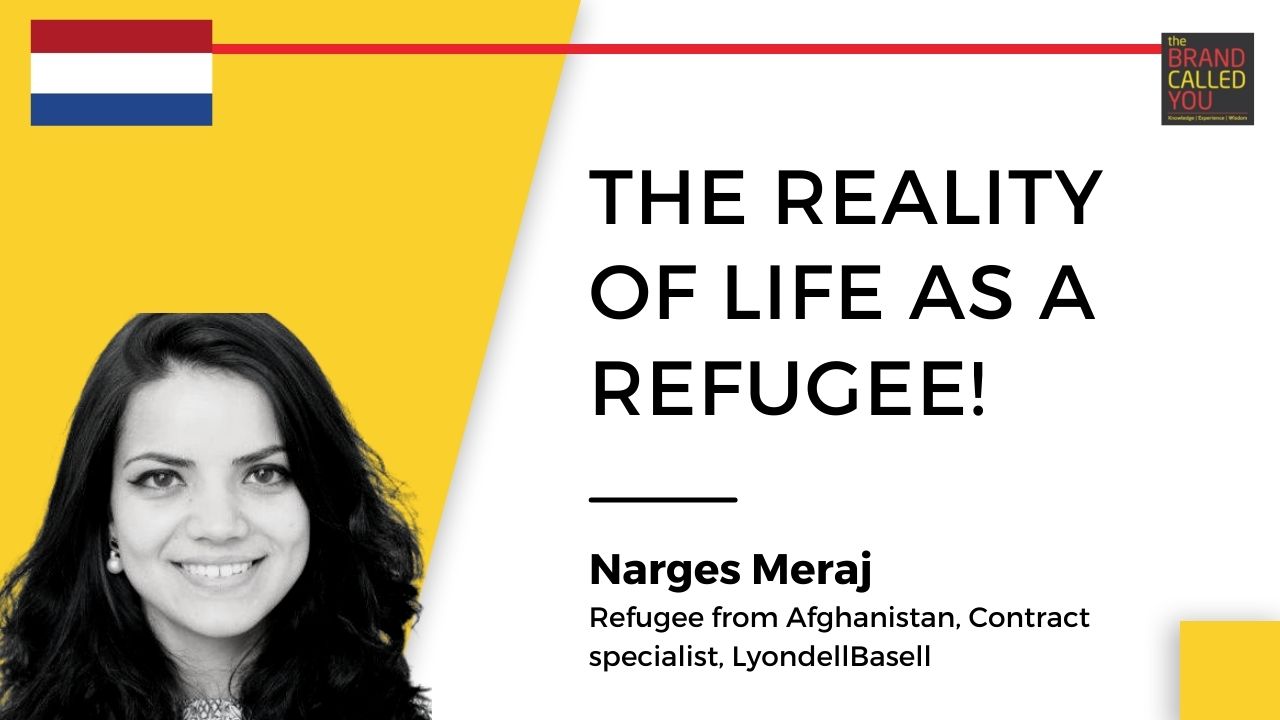Narges Meraj, Refugee from Afghanistan, Contract specialist, LyondellBasell
Narges Meraj is a contract specialist with Lyondellbasell in Rotterdam. She is also a Refugee from Afghanistan, Contract specialist, Lyondellbasell.
Podcast
Overview
After more than four decades of displacement, Afghan refugees constitute one of the largest protracted refugee situations in the world. There are nearly 6 million Afghans who have been forcibly displaced from their homes. Of those, 3.5 million are displaced within Afghanistan; 2.6 million are Afghan refugees living in other countries. We have Narges Meraj, Refugee from Afghanistan, Contract specialist, Lyondellbasel, with us to share her story as a refugee from Afghanistan.
[00:34] About Narges Meraj, Refugee from Afghanistan, Contract specialist, LyondellBasell
Narges Meraj came to the Netherlands via several countries, starting with Afghanistan than Pakistan then Russia.
Motivated, reliable, and experienced business advisor in the procurement sector within the energy industry. Well-rounded expertise in all aspects of contracting—pre-award and post-award. Possesses excellent interpersonal and team skills, and is able to communicate concisely with internal and external stakeholders. Capability in identifying gaps, creating opportunities, and implementing change. Ability to represent and secure an organization’s interests in commercial negotiations with an eye for detail.
[01:55] How did you come to the Netherlands?
I was born in Afghanistan in 1991, in the middle of the Civil War. It was not safe to stay in Afghanistan. Many people were leaving, and it was already 13-14 years later after the Soviet Invasion, so we left for Pakistan. We lived there for a year and then decided to move further away. Afghan people who had the means fled the country. My parents decided to move to Moscow as refugees for five years. But due to racism, we had to leave.
[06:32] Did your family explain why they had to put you through all this?
No, and it was very hard for me to understand because I thought we were just traveling somewhere. I only knew that we lived in Moscow, and I was going to school. And it was difficult for parents too because the priority is to keep you alive and not to make you feel comfortable.
[09:05] How did that survival mode stay with you even in the Netherlands?
The way I live my life, the way I communicate with my friends, my social network, and my professional job it’s always there it will never leave. It goes from generation to generation, and it will take quite a long time.
[12:11] How did trust and fear impact you personally?
A lack of trust in certain ‘Role models’ around me, definitely made a certain level of fear. It took me 12 years of therapy to process little traumas and fear and the lack of trust in people. So it is something you really need to work on. You need to be conscious that there is this problem because every single refugee has trauma, and it is important to realize that you have it and look for professional help. That is the only thing that can give your life a bit of dignity.
[14:36] What happened to you when you arrived in the Netherlands?
As a refugee when you arrive in the country, especially here in the Netherlands, you have to follow a certain system. You have to get to any police station you go there, and you say I’m here to ask for asylum, and then they will help you for camp to shelter. There they will register you, give you papers, and prepare you for an interview with the immigration officers. The process of asking for asylum can take many years and in total, we spent five and a half years in camps, which is very reasonable at that time.
[19:11] How was it like to live in refugee camps?
A refugee camp is like a closed area. We lived in seven different refugee camps because if one refugee camp closes they transfer you to another. You have to share a bathroom, kitchen, and everything, and it depends on what type of camp it is. Sometimes you get some allowance per week, and back then it was 50 gilders a week. You could buy anything you needed, the only thing that was paid for by the government was in the camp that was your accommodation.
Resources:
You can connect with Narges Meraj – LinkedIn
Enjoy this podcast?
If the story of a woman refugee moved you, and you could understand a bit of what they go through, then subscribe and share it with friends!
Love to give us 5 stars? ⭐⭐⭐⭐⭐ If you do, we’d love a review from you. Help us reach more people to keep them in the know as we talk to leaders, high achievers, and thought leaders from diverse backgrounds and nationalities. Excellence can come from anywhere; stay in the know, and hear from emergent high achievers and gurus.
Stay updated with what’s shaping the world today through the latest The Brand Called You Podcast episode. Follow us on iTunes, Spotify, and Anchor.fm.
Don’t forget to follow and message us on these platforms!
Website: https://tbcy.in/
Facebook: https://www.facebook.com/followtbcy
LinkedIn: https://www.linkedin.com/company/tbcy/
Twitter: https://twitter.com/followtbcy
YouTube: https://www.youtube.com/c/followtbcy
Thanks for listening!
Profile
Narges Meraj is a contract specialist with Lyondellbasell in Rotterdam. She is also a Refugee from Afghanistan, a Contract specialist, at Lyondellbasell.
At the age of two, she and her family fled Afghanistan for Russia, via Pakistan. The racism they faced there prompted another move five years later to the Netherlands. Narges spent the next five years in ten different refugee camps in the Netherlands until their asylum was accepted. The domestic violence, racism, and displacement she experienced during those turbulent years have fueled her passion for social justice.
Narges directly supports several families in the Greek refugee camp, Moria, as well as Afghan families who recently fled the Taliban and live in the Netherlands today.


